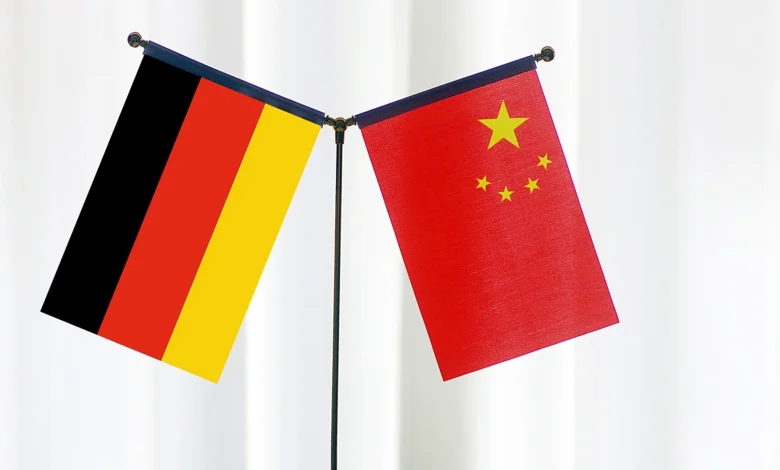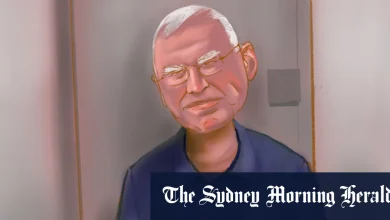China-Germany high-level financial dialogue reaches multiple outcomes, consensus

China Germany Photo:VCG
Chinese Vice Premier He Lifeng and German Vice Chancellor and Minister of Finance Lars Klingbeil co-chaired the 4th China-Germany High Level Financial Dialogue in Beijing on Monday, attended by senior officials from the two countries. Both sides reiterated that this dialogue mechanism is a key platform for bilateral exchange and policy coordination on strategic, overarching, and long-term fiscal and financial issues, according to China’s Ministry of Finance.
Both sides are committed to strengthening macroeconomic policy coordination at the bilateral and multilateral levels, jointly promoting global economic recovery and sustainable development, and safeguarding global financial stability, the ministry said in a joint statement outlining 27 points of consensus released on Monday night.
Both sides commit to upholding international and multilateral cooperation, combating unilateralism and trade protectionism, and supporting the role of the G20 as the premier forum for international economic cooperation, the statement said.
The dialogue mechanism was launched in 2015, with the second and third rounds held in 2019 and 2023.
Klingbeil arrived in Beijing on Monday, according to Reuters. The visit makes him the first minister-level official from the current German government to visit China, following German Foreign Minister Johann Wadephul’s postponement of his China trip at the end of October.
Chinese experts say the visit marks a key step in restoring institutionalized high-level exchanges that are expected to help steady bilateral ties and guide the new German government toward a more pragmatic China policy. They also said that Berlin should avoid politicizing economic and trade issues or inflating security concerns, arguing that an open, cooperative approach to China-Germany and China-EU relations best serves Germany’s interests.
Pragmatic step
Although Berlin’s governing parties all attach importance to relations with China, the SPD’s long-standing pragmatic China policy and its established communication channels are expected to facilitate a smoother visit compared with the CDU Party-led foreign ministry, said Jiang Feng, a research fellow at Shanghai International Studies University and president of the Shanghai Association of Regional and Country Studies.
Klingbeil, as SPD Party co-leader, has maintained solid channels of communication with China, and this visit reflects both the preservation and strengthening of those ties. His trip as Germany’s vice chancellor also underscores the German government’s strong commitment to its China policy and sends “positive signals,” Jiang told the Global Times on Monday.
Klingbeil will discuss major trade issues, such as rare earths limits, Reuters cited a finance ministry source as saying on Monday. The source noted that positions had been agreed in advance with EU officials responsible for Germany’s trade policy as a member of the bloc.
Dialogue with China is key to finding solutions for pressing problems like supply chain uncertainty and Chinese overcapacity, Klingbeil claimed on Sunday ahead of his trip to the country, according to Reuters.
Klingbeil on Monday also expressed hope for reaching consensus with China. He will seek solutions with his Chinese counterparts “despite growing international tensions” and push for improved market access for German companies, Bloomberg reported on Monday, citing a statement from the SDP chairman.
The latest high-level dialogue came amid rising bilateral trade tensions and at a time when Germany is facing increasingly severe domestic economic and industrial-chain pressures.
Germany is grappling with weak growth and unstable supply chains, which makes it urgent for Berlin to engage with Beijing and seek de-escalation, Jian Junbo, director of the Center for China-Europe Relations at Fudan University’s Institute of International Studies, told the Global Times on Monday.
The visit is an important step toward restoring high-level official exchanges and will have a positive impact on bilateral relations, Jian said. But he emphasized that Germany’s current predicaments mainly stem from the broad US tariffs imposed globally and the new conservative government’s competitive mindset and containment strategy toward China.
Chancellor Friedrich Merz said at a Berlin business forum on Thursday that he “won’t allow any components from China in the 6G network,” signaling a hardened stance toward firms such as Huawei, according to Politico.
Earlier this month, Reuters reported that Germany’s coalition government plans to re-examine its trade policies toward China, including in areas such as energy, raw material imports and Chinese investment in critical German infrastructure, and will establish a committee of experts to report to parliament.
However, ahead of his trip, Klingbeil told the German Press Agency that “We should not talk about China, but talk with China.” “China is an important international actor: there are many global problems that we can only solve together with China.”
Some observers in Germany also said that with the economy slowing, Berlin needs to work with China. But whether cooperation can be effectively carried out depends on efforts from both sides, including Germany and the new German administration. Germany needs to think carefully about how to handle relations with China under the current global landscape, they noted.
China has consistently regarded Germany as an important strategic partner, and Beijing’s policy has been to promote a healthy, balanced and constructive China-Germany relationship. While the German government also recognizes the importance of bilateral ties, different parties act according to their ideological preferences and political interests, Jiang said.
Jiang added that the current visit by vice chancellor Klingbeil demonstrates the new German government places emphasis on relations with China and may signal internal policy adjustments to better align with the needs of bilateral engagement.
Advance win-win co-op
Germany needs to recalibrate its China strategy, using the visit to advance a pragmatic approach and boost cooperation to revive its economy, Jian said. He noted that Berlin should curb excessive security interference in normal economic ties and remain open to engagement, as an export-driven economy cannot afford to lose partnership with Chinese companies and the Chinese market.
A Bloomberg report on Sunday said Germany’s top business leaders see the warning signs of over-reliance on China but are largely ignoring them, as major exporters, from autos to chemicals, continue pouring billions into new projects that tie their fortunes even closer to the world’s second-largest economy.
China overtook the US as Germany’s largest trading partner in the first eight months of 2025. German corporate investment in China jumped €1.3 billion ($1.5 billion) between 2023 and 2024, hitting €5.7 billion, Bloomberg reported, citing the Mercator Institute for China Studies.
A report by Bloomberg last week quoted BASF CEO Markus Kamieth as saying that it is essential for the German chemical giant to invest in China to secure future growth, urging Berlin to seek stronger ties with Beijing. “China is by far the strongest manufacturing country in the world. So if China grows, the market grows,” he told several media outlets in Berlin.
China always views and grows its relations with Germany from a strategic and long-term perspective. China and Germany are major countries and leading economies in the world, and cooperation is mutually beneficial, Guo Jiakun said in late-October when responding to questions about German Foreign Minister Johann Wadephul postponing his visit to China.
“Under the current circumstances in particular, it is all the more vital for the two sides to uphold mutual respect, equality and win-win cooperation, and advance the bilateral relationship on the right track,” Guo said.





